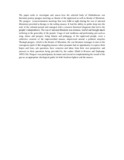Please use this identifier to cite or link to this item:
https://cris.library.msu.ac.zw//handle/11408/1452| Title: | The depiction of Pungwe meetings (Night vigil) as theatre of the oppressed in selected Zimbabwean war literature. | Authors: | Viriri, Advice | Keywords: | Pungwe, theatre, war literature, Zimbabwe. | Issue Date: | 2009 | Series/Report no.: | Unisa Latin American Report;Vol.I, No.1;p.11-24. | Abstract: | The paper seeks to investigate and assess how the selected body of Zimbabwean war literature portray pungwe meetings as theatre of the oppressed as well as theatre of liberation. The pungwe (conscientisation meetings that were held at night during the war of national liberation) provided a therapy to the toiling masses. It had the ability to probe deep into the soul of the colonial period and emerged with a concrete historical diagnosis that led to the people’s independence. The war of national liberation was tortuous, fearful and brought much suffering to the generality of the people. Usage of oral traditions and performing arts such as song, dance and pungwe, being theatre and pedagogy of the oppressed people, were a collective creation of the impoverished masses, improvised around a political storyline Through pungwe, which is the theatre of liberation, the war literature manages to min or the courageous spirit of the struggling masses where peasants had an opportunity to express their hopes and fears, ask questions, have concerns and ideas from their own perspective and answers to their questions being provided by the cadres (Kidd in Boeren and Espkamp, 1992:136). Pungwe was participatory in nature and crucial in complementing the sound of the gun as an appropriate ideological guide for both freedom fighters and the masses. | URI: | http://hdl.handle.net/11408/1452 | ISSN: | 0256- 6060 |
| Appears in Collections: | Research Papers |
Files in This Item:
| File | Description | Size | Format | |
|---|---|---|---|---|
| the depiction.pdf | Abstract | 15.82 kB | Adobe PDF |  View/Open |
Page view(s)
224
checked on Feb 15, 2026
Download(s)
46
checked on Feb 15, 2026
Google ScholarTM
Check
Items in MSUIR are protected by copyright, with all rights reserved, unless otherwise indicated.



